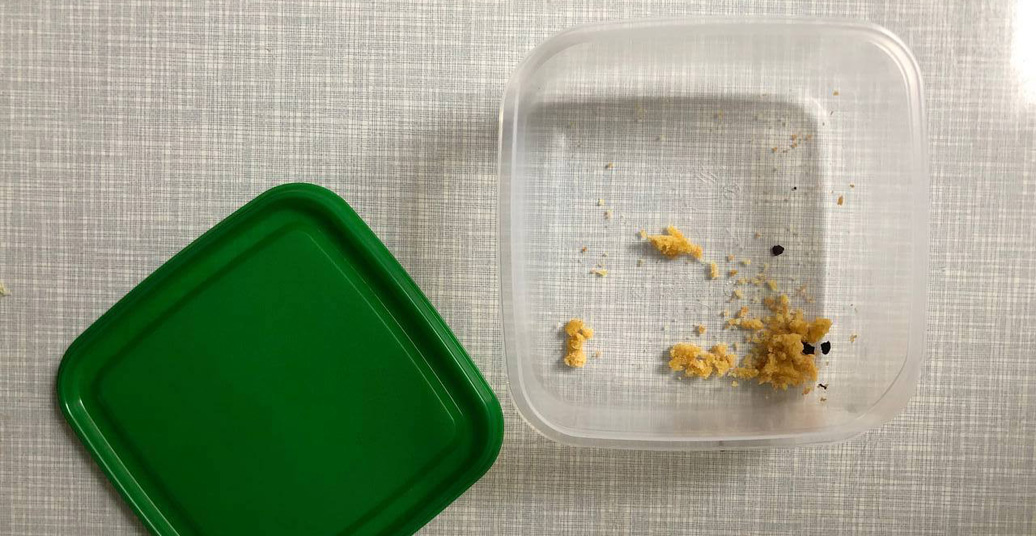When the possibility of meeting and touching people has been restricted due to the Corona pandemic, Inky Lee reflects on physical intimacy.
‘I must be a crumb,’ she writes to her friend, K, when she receives random messages from some of her short-lived past lovers. Many people — including she herself and K — have been going through their crumb drawers during the Corona pandemic, since it isn’t possible to simply go out and meet new people. A crumb, K defines, is someone who you had any sort or length of sexual intimacy with in the past, and who you might consider poking again in times of despair caused by dwelling too long in a desert free of romance to see if there is a scrap of a chance to rekindle, even for a second, that long-gone flame of intimacy.
She and K are sitting by a canal with some distance between them, looking out over the water. It is spring. K talks about a recent exchange of messages with a crumb who K had one hot night with in pre-Covid times. The conversation, however, hasn’t been going in the direction that K wanted it to – another hot night doesn’t seem to be on the cards. So the two friends combine their brain power and imagination to work out who their alternative crumbs might be, and who they might be crumbs for.
She later tells another friend, L, about crumb cruising. “But why look for crumbs when you can have a whole pie?” L asks. L has always been exceptionally hopeful and romantic. L doesn’t live in Berlin, where many people seem to feel easily overwhelmed by the idea of a whole pie. She answers, “What if I don’t want a whole pie? What if the whole pie makes me bored? What if I rather just want bits from a few different pies?”
Now it’s summer. The virus is still with us. She and K are picnicking by a river on a sunny day. They are both in a terrible mood — extremely grumpy, in fact — because their respective recent hopeful romances have degraded unwillingly into crumbs. They feel exhausted by the crumb marathon and feel ready to slowly get to know a whole pie. They want to stay within the body of wanting, while at the same time, letting their desires morph into different shapes through the changing times. “I would take someone who is interested in me as a person, even if we have awkward sex, anytime over someone who wants a quick sexy transaction,” says K. By the end of the picnic, their grump has melted into tenderness, and they are holding each other, while squealing about their emotions and fears.
If she can’t find a ready-made pie, can she make a pie herself? This is a question she came to after she’d gone through the failures of pie hunting (summer), acceptance of and contentment to loneness (autumn), and, finally, a place of self-entertainment and self-help (winter). Winter, a perfect time for warm pie! But even the first question — ‘What kind of pie do I want to make?’ — presents itself as a challenge, so she asks another friend, M, for advice. “You can’t be picky during a lockdown,” M says. “Maybe you won’t be completely satisfied, but will only get 20 or 30 % of what you need. That’s enough.” K thinks this piece of advice is a gem. L doesn’t think it’s very inspiring.
She decides to take it one step at a time. First of all, the pie should not be too crumbly. She has never baked a pie before, so she consults the internet, and finds a link titled, ‘Non-flaky, non-crumbly pie crust’. Just what she needs! She is soon disappointed, however, to find out that this page contains only a slew of insignificant questions and answers about pie crust. Hungry for some chunkier information, she dives into the internet world of pie dough. She thinks it’s a great starting point to learn about pie baking from the omnipresent container of all pies: The Crust.
She is surprised to learn that even veteran pie bakers struggle to create the perfect crust. She thinks back to a recent dinner when her friend, N, baked a pot pie for the first time. The dough was so thick and tough that it was almost impossible to cut. N brought out a selection of different knives and kept attacking the pie, which sat as unflinching as a rock. Advice on the internet says that the only sure road to success in baking a pie crust that is not too tough, flaky, crumbly, sticky, soggy, or dry, is to make a lot of pies. So shouldn’t she be in the kitchen, kneading dough, instead of sitting in front of her computer and tapping away at the keys? Alas, this is the reality of the pandemic! We can’t just go and do things like we used to. This is why she is sitting here in the first place, looking at photos of pies she cannot touch or taste. She may as well enjoy it.
One of the oldest sweet junk-snacks in her country is called ‘Choco-Pie’, a layer of marshmallow between two layers of soft chocolate bread. Is a day a layer between the sun and the moon? Is she a layer between the head and the heart? Is her life a layer between clarity and doubt? Are all her feelings merely crumbs of life? What kind of pie is she? Has she been birthed into this oven of a world, and now sits here being more and more baked as time passes until she is flavourless, colourless, useless, and burnt, and eventually crumbles into black ashes? Whose hands turn the temperature knob of the oven? There are so many things she doesn’t understand. She could learn from her cat, who, as soon as she lies down with her stomach flat on the floor, climbs up softly onto her back, kneads her butt gently for just the right amount of time (as many pie bakers enthusiastically underline) with her pink paws, and falls asleep. Is simplicity a kind of wisdom that she can learn?
She walks into a grocery store, sees ready-made dough, and impulsively buys it. Back at home, she realises that she has no pie tin. She looks at her cat. Her cat yawns. Perhaps she can make bite-size pie balls instead? She turns the oven on. She wonders what she can fill the small balls with. No ideas come. Despair knocks her out flat on the kitchen floor. Her cat climbs on her back and kneads her butt. They both fall asleep by the warm oven.





